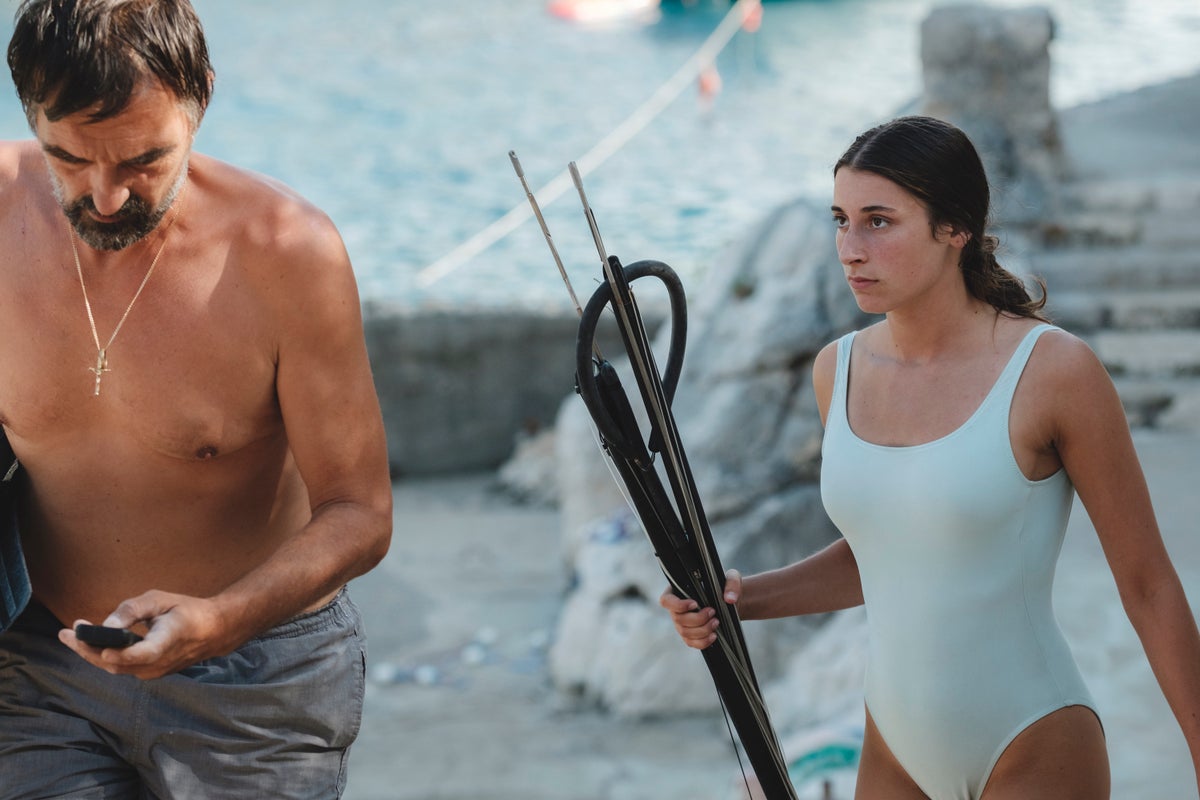
The story of how Croatian filmmaker Antoneta Alamat Kusijanović got Martin Scorsese to help her make her first feature is, she thinks, “a boring one.”
Boring might be a bit modest, but it was rather quick. The day after her graduation from film school, she flew to Cannes, shook his hand and came out of their meeting with his company Sikelia on board to executive produce her movie “ Murina.”
“It was too easy,” she said. “I don’t know if it happens like that every day. I don’t think so.”
But Scorsese saw something in Kusijanović and her short “ Into the Blue,” about a young teenage girl and her mother who flee an abusive household and seek refuge on an idyllic Croatian island. The 22-minute film won several prizes at international film festivals and was nominated for a student Academy Award.
“Here was a director with a picture she needed to make who was clearly in it for the long haul,” Scorsese wrote recently. “I wanted to help her get it into production.”
“Murina,” which opens in New York on Friday and in Los Angeles on July 15, is a picturesque, sun-soaked thriller about a 17-year-old girl, Julija (Gracija Filipović), living on a rocky, remote island on the Adriatic with a cruel, domineering father (Leon Lučev) and a complacent mother (Danica Čurčić). She gets a tease of a larger world when a cosmopolitan outsider (Cliff Curtis) arrives with big ideas about her future.
Film critic Jessica Kiang wrote in her review that “Murina” feels like something Patricia Highsmith ("The Talented Mr. Ripley," "Carol'') might have written.
Kusijanović had been grappling with the idea of chauvinism that's so deeply rooted in a society that it's mistaken as “cultural mentality” when she started to write. She wrote the film specifically for Filipović, who starred in “Into the Blue,” as she wanted to capture her on the edge of adulthood at 17 and 18.
“I wrote ’Murina for her but also wrote it for myself," she said. "I wrote it for many women around the world and especially in Croatia.”
In Julija is a character who lives in a physical paradise, but is starting to see cracks in the veneer.
"I hope she’s someone everybody relates to," Kusijanović said. “She will not be made small. She needs to live through her youth and her power. And she will protect herself no matter what it takes. That’s how I would like to think of this new generation of women."
Kusijanović was born and raised in Dubrovnik, a small city in Croatia on the Adriatic coast, and fell in love with theater at a young age. She attended plays with her mother and began acting as a child. Directing, however, was not on her mind. In Croatia, there have only been a handful of female directors, she said. It wasn’t a path that seemed open to her.
“Every condition, no matter how good it is, if it’s not developing and evolving emotionally, intellectually, creatively, becomes a prison,” she said. “In my country, I see sometimes a place that’s stagnating because of the lack of imagination. But then again, to be fair, it’s not only Croatia. I see it because I am emotionally connected to Croatia, but I also see that everywhere.”
She took a big leap and moved to New York to do an internship with a film company. After some encouragement from a friend, she decided to enroll in Columbia, where she got an MFA in screenwriting and directing. That's all to say that the Scorsese meeting may have been easy, but it was also something that she’d been working toward her whole life.
“I actually earned it,” she said. “I worked very hard for it, and a lot of things needed to connect in the past for that moment to come to fruition starting from the age of 4. There is no such thing as an overnight success.”
“Murina” had its world premiere at the 2021 Cannes Film Festival and won Kusijanović the Caméra d’Or, for best first film. But she wasn’t there to accept the award. She was nine months pregnant at the time, and decided to leave Cannes and drive the 13 hours home to Croatia one night. Soon after she delivered her first child.
Even with all the accolades, Kusijanović said it was a note Scorsese wrote about the film that moved her the most. She keeps it close by in her phone and excitedly reads it out loud.
“I’m so impressed by ‘Murina:' By the raw immediacy of the conflict between father and daughter, which feels like it could only happen in such an elemental setting; By the psychosexual tensions between all the characters, so beautifully acted; And by the sheer physical force of the picture,” Scorsese wrote. “I’m excited for audiences to see ‘Murina’ for themselves and to witness the emergence of an extremely talented young filmmaker.”
Kusijanović does have one quibble with the note, however.
“I’m not young,” she deadpanned. “Maybe 36 is young for a director.”
As the film has played around Croatia, Kusijanović has received many messages about it from men and women. Some recognize their families in the film. Some recognize themselves. Others have said that they just see a normal family.
“That is the audience that needs this film,” Kusijanović said. “Misogyny and disrespect of women is the same everywhere. It just has different names in different countries.”
—-
Follow AP Film Writer Lindsey Bahr on Twitter: www.twitter.com/ldbahr







